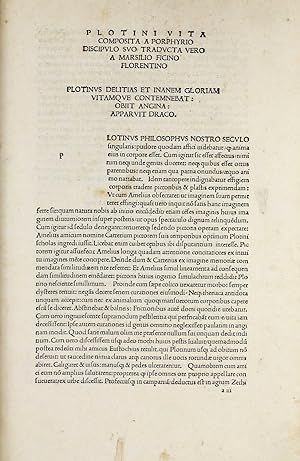Descripción
7 May 1492. Folio (330 x 220 mm). 441 (of 442) unnumbered leaves (lacking initial blank a1 only). Signatures: a10 (-a1) b8 c-n10 o12 p10 q-z10 &10 aa-uu10, [chi]2. 45 lines, roman type, 3- to 9-line initial spaces with printed guides, woodcut printer's device on uu10r, printer and date from colophon on uu10r, title derived from caption in capital letters on leaf a2r, caption title on a3r: Plotini vita composita a Porphyrio discipvlo svo tradvcta vero a Marsilio Ficino Florentino, two errata leaves bound at end. Early 19th-century navy morocco over wooden boards; boards, board edges, turn-ins and spine richly tooled in gilt, plain spine titled in gilt, all edges gilt, marbled endpapers (extremities lightly rubbed). Text bright and clean, a few tiny wormholes on first 3 and last 2 leaves (partially filled), early marginalia to first leaves, short closed tear to blank margin of leaf 2i2, small dampstain in bottom gutter corner of last 2 quires. Provenance: Thorold Syston Park - the Wardington copy (bookplates, sold at Sotheby's on May 12 2006, lot 3). An outstanding copy in fine binding. ---- RARE EDITIO PRINCEPS OF PLOTINO'S OPERA, translated into Latin by Marsilio Ficino. Plotinus' works, compiled by his disciple Porphyry, are the primary documents of Neo-Platonism and played an important role in the revival of Plato in the Renaissance. Ficino considered Plotinus the summus interpres of Plato. Ficino, encouraged by Pico della Mirandola, translated the works for his patron and financer of the task, Lorenzo de'Medici. Ficino completed the translation in 1486 and his commentary on them in 1491. Lorenzo died one month before their publication. Ficino's dedicatory letter to Lorenzo in this edition is an important document in the history of Florentine Platonism, as it recounts how Lorenzo's father, Cosimo de'Medici, having heard Gemistus Pletho's lectures on the mysteries of Plato, had commissioned Ficino to translate the Platonic corpus. In the midst of his labours the first works of Hermes Trismegistus came to light, and Cosimo requested that Ficino interrupt his work on Plato in order to translate Hermes. From the same dedicatory letter we find that Pico encouraged Ficino to translate Plotinus. In Plotinus, Ficino had found parallels not only to Asclepius, which he mentions in De Vita, but also a source of his beliefs on astral influences, the value of spiritual experiences, and the role of music as a tool for raising souls to God. (see also C. Dalmier, Apollonius Dyscole - Traité des conjonctions, Paris, 2001, pp. 280-82). BPH 161; Hain-Cop. 13121*; Proctor 6156; Goff P815; BMC VI 640; IGI 7906. - Visit our website for additional images and information. N° de ref. del artículo 002993
Contactar al vendedor
Denunciar este artículo
![]()




